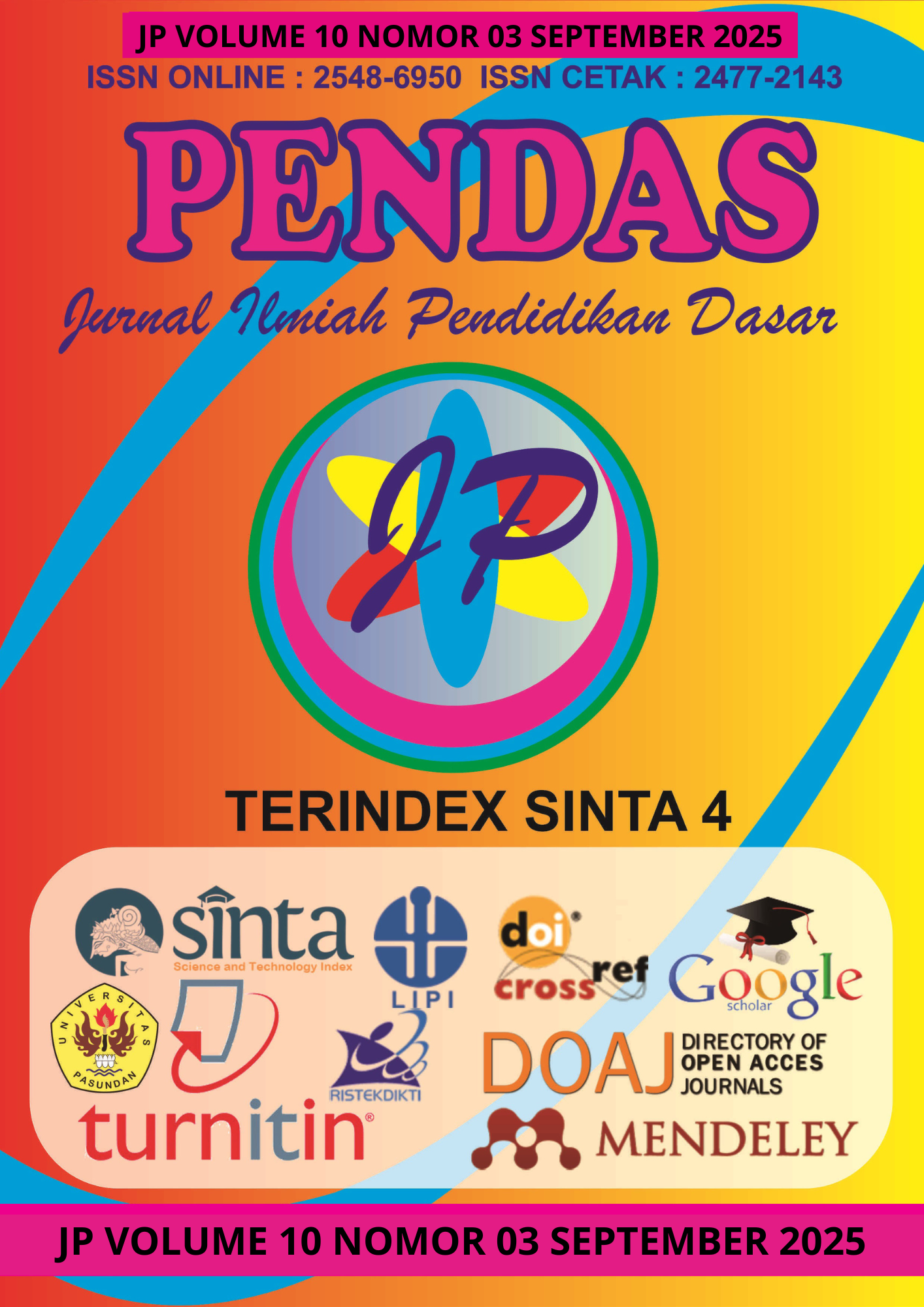BEST PRACTICE PENGUATAN KARAKTER KERJASAMA MELALUI KESEPAKATAN KELAS
DOI:
https://doi.org/10.23969/jp.v10i03.29764Keywords:
character, cooperation, classroom agreement, early childhood educationAbstract
Strengthening the character of cooperation in early childhood is a strategic step in building lifelong social skills. This study aims to describe the best practice of strengthening the character of cooperation through the implementation of classroom agreements at TK Negeri 1 Alalak. This research used a qualitative approach with a case study method. Data were collected through observation, interviews, and documentation. The results showed that the participatory implementation of classroom agreements was effective in developing children's cooperative character. The children willingly and joyfully worked together to tidy up the reading corner and play equipment after use. They were able to carry out the classroom agreements that they had created together, which fostered a sense of responsibility and togetherness. Character reinforcement was consistently implemented through habitual activities, verbal praise, symbolic appreciation, and parental involvement. These findings confirm that classroom agreements can serve as an effective strategy for instilling the value of cooperation in early childhood. This study recommends the consistent and participatory application of classroom agreements in early childhood education, and further research on strengthening other characters such as independence and responsibility.
Downloads
References
Deci, E. L., & Ryan, R. M. (2000). The ‘what’ and ‘why’ of goal pursuits: Human needs and the self-determination of behavior. Psychological Inquiry, 11(4), 227–268.
Hidayah, R. (2018). Pendidikan karakter berbasis pembiasaan. Jurnal Pendidikan Karakter, 8(2), 219–231.
Johnson, D. W., & Johnson, R. T. (1999). Learning together and alone: Cooperative, competitive, and individualistic learning. Allyn & Bacon.
Johnson, D. W., & Johnson, R. T. (2019). Cooperation and the use of technology. Educational Technology Research and Development, 67(4), 685–709.
Kementerian Pendidikan dan Kebudayaan. (2020). Profil pendidikan karakter. Jakarta: Kemdikbud.
Lickona, T. (1991). Educating for character: How our schools can teach respect and responsibility. New York: Bantam Books.
Nuraini, L. (2021). Hubungan hubungan sosial anak usia dini dengan kebahagiaan anak. Jurnal Pendidikan Anak, 10(1), 45–53.
Novitawati, N. (2021). Penguatan karakter melalui pembelajaran berbasis proyek di PAUD. Jurnal Obsesi: Jurnal Pendidikan Anak Usia Dini, 6(2), 1102–1111.
Novitawati, N. (2022). Implementasi pembelajaran berbasis lingkungan dalam meningkatkan karakter peduli sosial anak usia dini. Jurnal Ilmiah Pendidikan, 8(1), 35–44.
Novitawati, N. (2023). Membangun karakter mandiri anak usia dini melalui model pembelajaran berbasis proyek. Jurnal Pendidikan Anak Usia Dini, 7(1), 20–30.
Piaget, J. (1970). Science of education and the psychology of the child. New York: Viking.
Prihandoko, Y., & Wasitohadi, W. (2015). Efektivitas pembelajaran berbasis kognitif moral melalui model Value Clarification Technique (VCT) ditinjau dari hasil belajar PKn dengan mempertimbangkan moral judgement. Satya Widya, 31(1), 17–31.
Prihandoko, Y., Slamet, S. Y., & Winarno, W. (2017). Cognitive moral approach to civics education material development in the elementary school. Jurnal Kependidikan: Penelitian Inovasi Pembelajaran, 1(2), 223–161.
Prihandoko, Y., Slamet, S. Y., & Winarno, W. (2018). Cognitive moral based on civics education material in elementary school. Journal of Education and Learning (EduLearn), 12(3), 472–477.
Rahmawati, S. R., Suriansyah, A., Harsono, A. M. B., Iskandar, B. A., & Putra, E. C. S. (2024). Pelaksanaan pendekatan “tegas tapi menyenangkan” terhadap kedisiplinan siswa di SD Kristen. Jurnal Teknologi Pendidikan dan Pembelajaran, 2(2), 711–719.
Rasmini, N. W. (2023). Penyimpangan perilaku sosial-emosional anak pada pengasuhan orang tua tunggal korban perceraian. Jurnal Obsesi: Jurnal Pendidikan Anak Usia Dini, 7(5), 6017–6026.
Santoso, R. (2022). Penguatan karakter melalui kesepakatan kelas di sekolah dasar. Jurnal Pendidikan Karakter, 12(4), 735–748.
Suyanto, S. (2020). Pendidikan karakter untuk anak usia dini. Jakarta: Prenadamedia Group.
Suriansyah, A., & Aslamiah, A. (2015). Strategi kepemimpinan kepala sekolah, guru, orang tua, dan masyarakat dalam membentuk karakter siswa. Cakrawala Pendidikan, 2(2), 87–106.
Vygotsky, L. S. (1978). Mind in society: The development of higher psychological processes. Cambridge: Harvard University Press.
Yogi Prihandoko. (2020). Implementasi pendekatan moral kognitif dalam pembelajaran nilai di sekolah dasar. Jurnal Pendidikan Dasar, 11(2), 150–159.
Downloads
Published
Issue
Section
License
Copyright (c) 2025 Pendas : Jurnal Ilmiah Pendidikan Dasar

This work is licensed under a Creative Commons Attribution 4.0 International License.



















